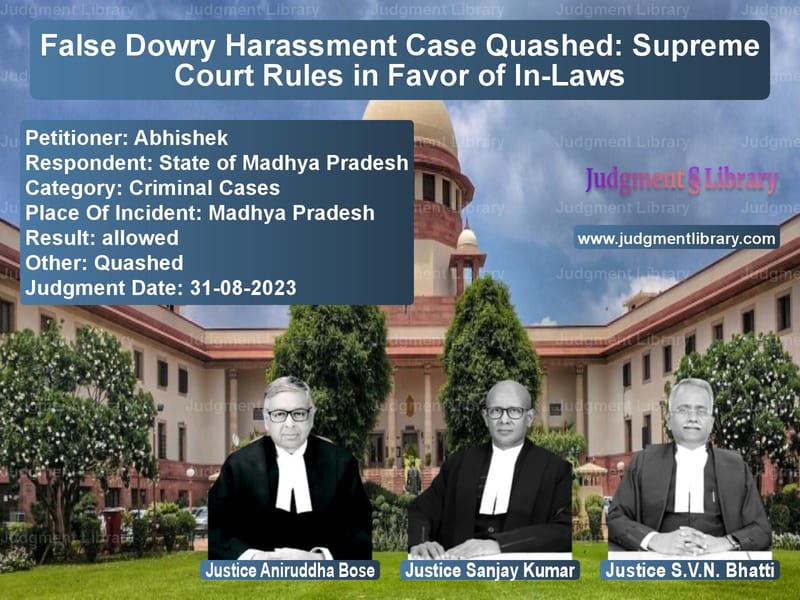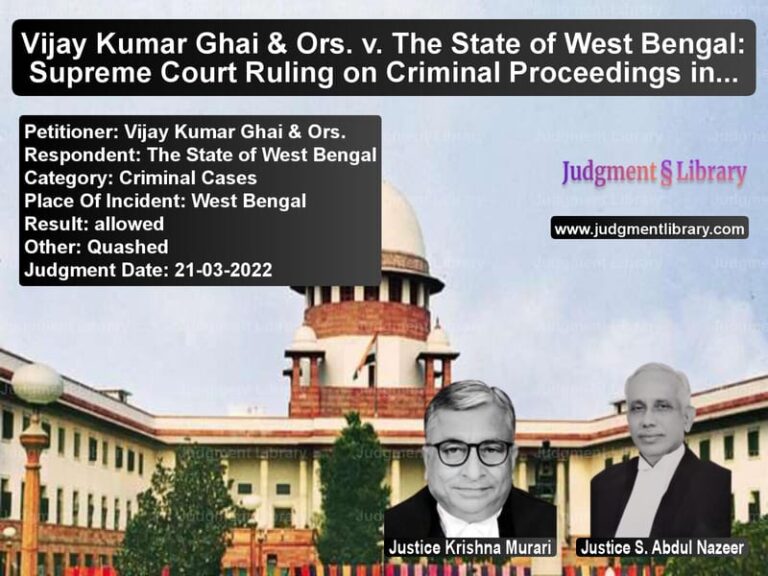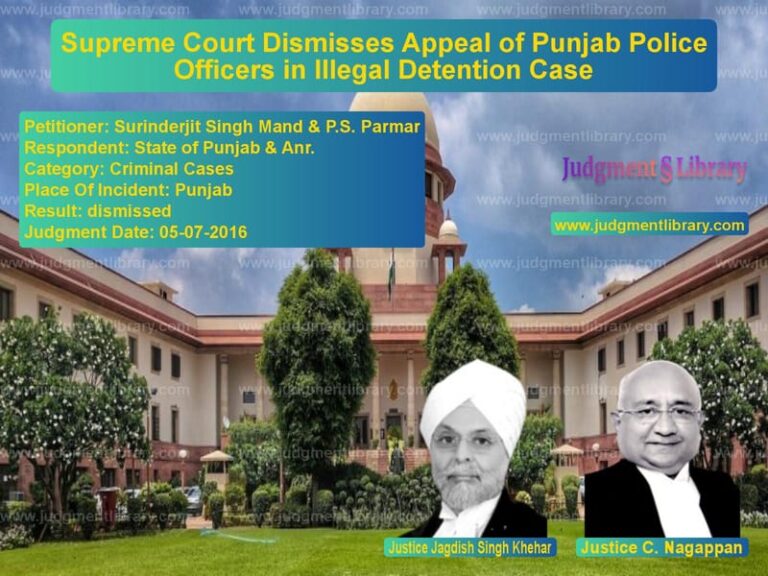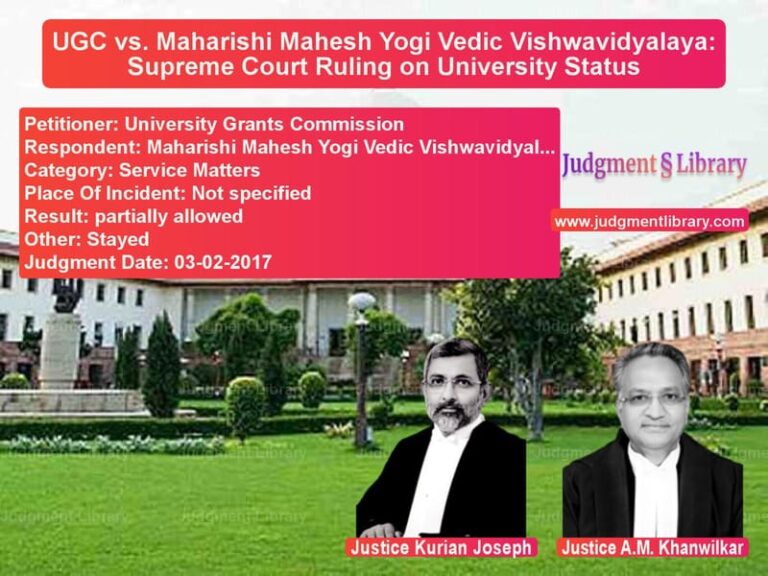False Dowry Harassment Case Quashed: Supreme Court Rules in Favor of In-Laws
The Supreme Court recently delivered a crucial verdict in the case of Abhishek vs. State of Madhya Pradesh, emphasizing the misuse of dowry harassment laws and the importance of protecting innocent family members from baseless allegations. The judgment quashed the criminal proceedings against the in-laws of the complainant, setting a precedent for dealing with false matrimonial cases under Section 498A of the Indian Penal Code (IPC).
Background of the Case
The case revolves around a marital dispute between Bhawna and her husband, Nimish Gour, who married in 2007. After a few years, their relationship deteriorated, leading to multiple legal battles, including a divorce petition and allegations of dowry harassment. Bhawna filed a complaint against her husband and in-laws in 2013, four years after leaving her matrimonial home.
Her complaint resulted in the registration of FIR No. 56 of 2013 under Section 498A IPC and Sections 3 and 4 of the Dowry Prohibition Act, 1961. The accused included her husband, mother-in-law Kusum Lata, and brothers-in-law Abhishek and Sourabh.
Legal Proceedings and Key Developments
- 2013: Bhawna filed a complaint against her in-laws, accusing them of dowry harassment.
- 2013: The accused secured anticipatory bail.
- 2013-2014: The accused moved the Madhya Pradesh High Court under Section 482 CrPC, seeking to quash the FIR.
- 2015: The High Court dismissed their quash petitions, leading to an appeal before the Supreme Court.
- 2023: The Supreme Court quashed the criminal proceedings against the in-laws, citing insufficient evidence and an unreasonable delay in filing the complaint.
Arguments by the Petitioner (Abhishek and Family)
The petitioners contended that:
- The allegations were vague, general, and lacked specific instances of harassment.
- Bhawna left her matrimonial home in 2009 but filed the complaint in 2013, four years later, without any intervening incidents.
- One of the accused, Sourabh, was working in Delhi and had no physical interaction with Bhawna during the alleged period of harassment.
- Abhishek, a judicial officer, was being targeted with false accusations, including anonymous complaints to the High Court and Anti-Corruption Bureau.
- The complaint was filed as a retaliatory measure in response to Nimish’s divorce petition.
Arguments by the Respondent (State of Madhya Pradesh)
The prosecution defended the complaint, arguing that:
- The complaint detailed instances of dowry demands and mental harassment.
- The delay in filing the complaint should not be a ground for quashing the case.
- The trial court should be allowed to examine the evidence rather than dismissing the case at a preliminary stage.
Key Observations by the Supreme Court
The Supreme Court made the following critical observations:
1. Delay in Filing the Complaint
“Bhawna admittedly parted ways with her matrimonial home in February 2009, be it voluntarily or otherwise, but she did not choose to make a complaint against them in relation to dowry harassment till the year 2013.”
The Court noted that such an extensive delay without any new incidents raises serious doubts about the genuineness of the allegations.
2. Lack of Specific Allegations
“The allegations are mostly general and omnibus in nature, without any specific details as to how and when her brothers-in-law and mother-in-law, who lived in different cities, subjected her to harassment for dowry.”
The Court emphasized that vague accusations without concrete evidence should not be allowed to proceed to trial.
3. False Complaints Against Abhishek
“The fact that Bhawna confessed to making a vicious complaint against Abhishek to the High Court clearly shows that her motives were not clean and she clearly wanted to wreak vengeance against her in-laws.”
The Court pointed out that Bhawna’s actions suggested an intent to harass and intimidate her in-laws rather than seek genuine justice.
Legal Precedents Considered
The Court relied on several landmark judgments, including:
- State of Haryana v. Bhajan Lal (1992): Established guidelines for quashing FIRs when allegations are manifestly false.
- Kahkashan Kausar v. State of Bihar (2022): Highlighted the misuse of Section 498A IPC to harass in-laws.
- Preeti Gupta v. State of Jharkhand (2010): Emphasized the need for courts to scrutinize complaints under Section 498A to prevent abuse of the law.
Final Judgment
Based on the above findings, the Supreme Court ruled:
“Given the totality of the facts and circumstances, we are of the considered opinion that Bhawna’s allegations against the appellants, such as they are, are wholly insufficient and, prima facie, do not make out a case against them.”
The Court quashed FIR No. 56 of 2013 and the criminal proceedings against the in-laws, stating that allowing the trial to continue would be an abuse of the legal process.
Conclusion
The Supreme Court’s ruling in Abhishek vs. State of Madhya Pradesh is a landmark decision reinforcing the need to prevent the misuse of dowry harassment laws. The judgment sets a precedent for protecting innocent family members from baseless allegations and emphasizes the importance of filing complaints within a reasonable timeframe. The ruling serves as a strong deterrent against the exploitation of legal provisions intended to protect genuine victims of dowry harassment.
Petitioner Name: Abhishek.Respondent Name: State of Madhya Pradesh.Judgment By: Justice Aniruddha Bose, Justice Sanjay Kumar, Justice S.V.N. Bhatti.Place Of Incident: Madhya Pradesh.Judgment Date: 31-08-2023.
Don’t miss out on the full details! Download the complete judgment in PDF format below and gain valuable insights instantly!
Download Judgment: abhishek-vs-state-of-madhya-prad-supreme-court-of-india-judgment-dated-31-08-2023.pdf
Directly Download Judgment: Directly download this Judgment
See all petitions in Dowry Cases
See all petitions in Domestic Violence
See all petitions in Judgment by Aniruddha Bose
See all petitions in Judgment by Sanjay Kumar
See all petitions in Judgment by S.V.N. Bhatti
See all petitions in allowed
See all petitions in Quashed
See all petitions in supreme court of India judgments August 2023
See all petitions in 2023 judgments
See all posts in Criminal Cases Category
See all allowed petitions in Criminal Cases Category
See all Dismissed petitions in Criminal Cases Category
See all partially allowed petitions in Criminal Cases Category







